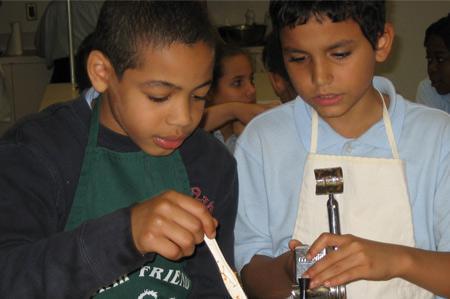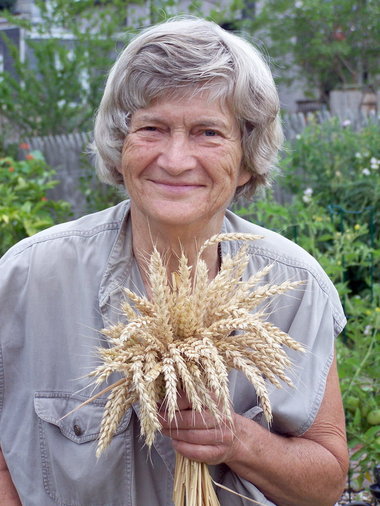The Laurie M. Tisch Center for Food, Education & Policy

The Challenge
Today, the United States is inundated by tens of thousands of new “food” products; billion-dollar marketing campaigns for highly-processed, minimally nutritious foods; and confusing health claims about food. Add to that mix the lack of time, money and access which many Americans face, and it is understandable why so many struggle to eat well. The current epidemic of diet-related health problems, particularly in low-income communities of color, especially attests to this struggle. More broadly, the current food system imperils the health of the planet.
The Charge
Transforming our current food system, which imperils the health of the planet, through food and nutrition education. The Executive Director of the Tisch Food Center is Pamela Koch (Ed.D. ’00), Research Associate Professor of Nutrition Education.
In a Nutshell

To improve food systems and public health we must give people power to demand more whole and plant-based foods, fewer processed foods, and movement towards regenerative agriculture. Yet, we know food and nutrition is a politically charged subject and our profession will have to confront entrenched power structures by taking on Big Food. While this will not be easy, it is critical.

Teaching food and nutrition might be viewed as the single most important educational activity of a society. If persons do not learn to obtain and consume food so as to sustain themselves and their dependents, all other learnings are irrelevant.
The Approach:
Founded in 2012, the Tisch Food Center is based in the nation’s oldest Program in Nutrition. The mission of the Tisch Food Center is to conduct research on food and nutrition education practice and policy. The Center translates its research into resources for educators, policy makers and advocates to empower people to demand healthy, just and sustainable food.
Recent Achievements:
- During summer 2019, the Tisch Food Center launched an online course for educators called “Teaching Food and Nutrition for All.” The course, which proved so popular that it will be offered twice a year, gives students the tools and confidence to bring food and nutrition to life in their classrooms.
- In March 2018, the Tisch Food Center published A is for Apple: The State of Nutrition Education Programs in New York City Schools, showing that only 56 percent of New York City schools had external food and nutrition education programs. Following a stakeholder summit, a newly formed Food-Ed Coalition successfully secured $250,000 from the City Council, to launch a Food-Ed Hub based in the Tisch Food Center.
- In January 2018, the Tisch Food Center released Empowered Eaters, “the first and only comprehensive analyses of federal, state and city policies and programs that can support nutrition education.” The two reports include specific recommendations to improve the nutrition education landscape in New York State and City.
Current Focus:
- A December 2019 Tisch Food Center report, Cooking Outside the Box: How a Scratch Cooking Pilot in the Bronx is Reshaping Meals in New York City Schools, shows that the largest school system in the country, with 1.1 million students, can successfully turn back the clock and serve students meals cooked from scratch. The report identifies key actions, including significant infrastructure investments, needed to scale up the scratch-cooked school meals pilot across the district's approximately 1,800 schools.
- The Tisch Food Center leads the WELL Campaign (Wellness, Equity and Learning Legislation), a statewide advocacy campaign to ensure that all New York State students have schools that support their physical, mental, and emotional health and well-being.
- The Food-Ed Hub at the Tisch Food Center now acts as a formal structure to foster collaboration and coordination among New York City Food-Ed organizations, helping to align resources, increase efficiency, avoid duplication of effort, and identify best practices that can be brought to scale.
Program in Nutrition Alumni in High Places:
- Cristina Álvarez (Ph.D. '18), Statistics Division, Food and Agriculture Organization of the United Nations, Rome (Italy), in the development and validation of nutritional indicators derived from household consumption and expenditure surveys
- Ian Ang (Ph.D. '17), Senior Research Fellow, National University Health System (NUHS) Regional Health System (RHS) Planning Office in Singapore
- Avigdor (Dori) Arad (Ph.D. '18), researcher and clinician, Icahn School of Medicine at Mount Sinai
- Marissa Burgermaster (Ph.D. ’15), Assistant Professor, University of Texas at Austin
- Kate Burt (Ph.D. '15), Assistant Professor, Lehman College, City University of New York
- Christen Cupples Cooper (Ed.D. '17), Founding Director of Nutrition, College of Health Professions, Pace University in Pleasantville, NY. Her program recently received accreditation from ACEND, an arm of the Academy of Nutrition and Dietetics.
- Ali Hard (M.S. '17), Professional Staff, U.S. House of Representatives Committee on Education and Labor
- Kate MacKenzie (M.S. ’02), Director, Mayor’s Office of Food Policy, New York City
Recent Funders:
- Joyce & Irving Goldman Family Foundation
- New York City Council
- New York City Department of Education, Office of Food & Nutrition Services
- New York Community Trust
- New York State Health Foundation
- Robert Wood Johnson Foundation
- Voices for Healthy Kids
- Generous matching gifts from an anonymous donor
External Partners:
- For the WELL Campaign, the Tisch Food Center works with dozens of statewide partners — from the Bronx to Buffalo — representing parents, educators, students, health professionals, anti-hunger advocates, and more. For a list of partners, visit wellcampaign.org.
- For the Food-Ed Hub, the Tisch Food Center works with the 80-plus organizations that provide food and nutrition education to New York City schools. Learn more about these partners on the Center’s Food and Nutrition Education Database.
- The Tisch Food Center partners with government agencies and elected officials to conduct research, provide evidence for impactful policies, and align public and private food and nutrition education initiatives.